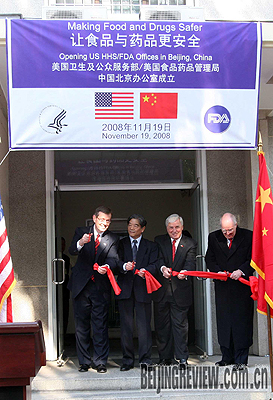|
 |
GRAND OPENING: Michael Leavitt (left), U.S. Secretary of Health and Human Services, Shao Mingli (second from left), Chinese Vice Minister of Health, and Andrew von Eschenbach (second from right), Commissioner of the U.S. Food and Drug Administration (FDA), cut the ribbon to inaugurate the FDA office in Beijing on November 19 |
The opening of U.S. Food and Drug Administration (FDA) offices in China shows China's cooperative attitude and will be conducive to reducing potential food safety disputes between the two countries, Chinese experts said.
The U.S. Department of Health and Human Services opened three FDA offices in Beijing, Guangzhou and Shanghai in November in a bid to improve import safeguards. Eight senior FDA officials, including inspectors and technical experts in foods, medicines and medical devices, will work in the China offices.
"The offices may help address food safety problems at their source, thus preventing trade frictions between China and the United States over this issue," said Zhou Shijian, a senior fellow at the Center for China-U.S. Relations, Tsinghua University.
If their products are found to be substandard in the United States, Chinese exporters have to recall them, Zhou said. This can cause trouble for both countries. It will no longer happen now that the FDA can test products in China before they are shipped across the Pacific Ocean, he said.
In addition, Zhou believes the FDA offices in China are a "good thing" because they enable Chinese and U.S. officials to communicate in a more timely and effective manner.
A permanent presence in China would help the FDA cope with the challenges presented by globalization, said FDA Commissioner Andrew von Eschenbach. "We look forward to working with the Chinese Government and manufacturers to ensure that FDA standards for safety and manufacturing quality are met before products are shipped to the United States," he said.
FDA officials will assist the Chinese Government in improving its regulatory systems for exports to help ensure product safety. The agency will also establish independent Chinese certification of products by a trusted source approved and supervised by the FDA.
Food safety has been a hotly contested issue between China and the United States in recent years. Days before the FDA opened offices in China, the United States detained Chinese food products made with milk and other dairy ingredients until independent testing proves they are free of melamine. Baby formula contaminated with this toxic chemical had sickened tens of thousands of Chinese infants, spurring the government to put more effort into the quality and safety of dairy products.
| 